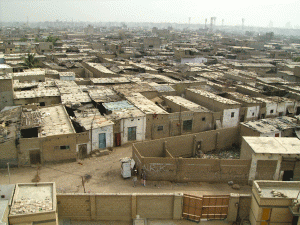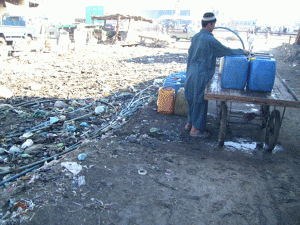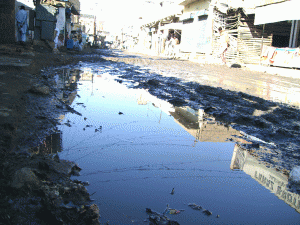Improving the quality of life for Karachi’s urban slum children costs far less then you may think. Noorjehan is one of 200,000 children who live in Karachi’s largest unofficial kutchi abadi: Moham-madi Machar Colony. She wakes up every morning at 5 am to do housework and also cooks for her family. Her mother is critically ill with Hepatitis C and her father, a day labourer, is away from the house from 6 am to 8 am, attempting to make the Rs. 2,500, that is the average monthly family income in this area. Because there is no access to natural gas, Noorjehan has to spend at least 3 hours in gathering, preparing and lighting the firewood on which she must cook. At fourteen, she is the primary caregiver to six younger siblings.
Machar Colony is home to 750,000 people who have no access to gas, safe water or sewage facilities. Most children like Noorjehan are unable to attend the tiny private schools that dot the locality because they are employed, either in caregiving or in working long hours in the neighbourhood’s many ‘jinga baras’ or shrimp peeling warehouses. Hours of hard labour in appalling unhygienic conditions can earn a child Rs. 30-50 per day. It may seem like a pittance, but over half of the area’s families can only spend Rs. 300 a month on the care of each of their (on average six) children.
Concern for Children Trust (CFC) is a not-for-profit organization that has been actively working in Machar Colony since 1997. Originally founded as a project to ensure access to good quality healthcare and branded medication to the area’s children, it has developed in the past twelve years into a comprehensive community driven development project which addresses the unique challenges of the locality of three thematic areas: 1. Health (of which mental health is an integral part), 2. Education/ vocation and 3. Sanitation. In light of this new cohesive mandate to community building, CFC has successfully run health awareness projects, trained local birth attendants in safe delivery practices, built a well-outfitted mother and child healthcare center, introduced art therapy programmes in six local schools and implemented a community kitchen that allows local residents access to safe and green fuel. All this has been made possible with the generous support of private donors and with CSR initiatives implemented with local companies.
Additionally, after the devastating earthquake that rocked the country, CFC mobilized as a disaster relief organization, providing mental health training to local people in Kashmir and running a tent school for the children of Bandi Chakan whose only school building was destroyed by the natural disaster. As part of CFC’s commitment to sustainable development in communities, a permanent, earthquake proof school is currently under construction in the area.
CFC’s mandate, to build empowered lives for children and their families, forms the backbone of all community interventions. Community awareness meetings are carried out on a regular basis, community leaders are always consulted on projects in the design stage and an emphasis is placed in project design on sustainability in the future with minimum funding.
One way CFC approaches sustainability, is to invest in early interventions; health and education with the youngest members of the society ensures changes in habitualized behaviours in the community that prevent growth; family planning and the role of women for example. Members of the community who use CFC developed projects such as the Mother and Child Healthcare Center (MCH) or the Community Kitchen, pay a small fee for the service this usually covers the basic running cost of the project if used by a certain number of users over time.
Most recently, CFC has become involved with the relief effort for the Internally Displaced People (IDP) in the north west of our country. A CFC medical mission, in conjunction with two NGO’s on the ground in Mardan and Swat (Omer Asghar Khan Development Foundation and Sungi) provided medical care and medications to over 600 IDPs.
Additionally the mission created health profiles for each housing facility, identifying potential sources of disease and highlighting IDPs who require medical monitoring for chronic conditions.
CFC is externally audited each year, providing corporate partners and donors with the reassurance that their contributions are well spent.
Organizational costs account for less then 15 percent of the over all budget, due again to the successful long term partnership that CFC has built with corporate partners such as Glaxo Smith Kline who provide office space, stationery, technical support, computers and communication costs. This “in kind” CSR with some partners allows CFC to ensure that 85p of every rupee goes straight towards the running costs of projects, allowing the greatest coverage for each programme.
It costs just 1,000 rupees a month to provide 10 women with pregnancy tests, allowing CFC’s community doctors to provide well rounded prenatal care. Rs. 3,000 buys 300 safe delivery kits, allowing CFC’s trained traditional birth attendants (‘daees’) to ensure sanitary and safe birth for 300 women and their babies. Rs. 1,400 allows a child from the most challenging background to participate in a four week long summer art therapy programme that fosters self esteem and Rs. 3,000 a month pays the rent of the community kitchen, allowing 24 mothers to feed their children safe and nutritious food.
Noorjehan has been able to return to school as she now utilizes the facilities at the CFC community kitchen, allowing her to cook for her family in an hour and attend classes in the afternoon. Through awareness raising sessions at the Community Kitchen, Noorjehan is learning about hygiene, how to keep her siblings safe from hepatitis, how to save money using a simple piggy bank and the importance of continuing her school work. For every child that a CFC programme reaches, there are 200 we are unable to help due to a shortage of funds.
Companies can play a pivotal role in assisting well reputed NGO’s to attempt to ensure opportunities for health, education and environment are provided to people from all walks of life.
Questions for corporations to ask an NGO before forming CSR linkages with them
- Is the organization registered?
- Does the organization have tax exemption?
- How does the organization handle its finances?
- Is the organization externally audited?
- Does the organization have a governing body/trustees?
- What experience does the organization’s management have with development projects?
- How long has the organization been working with a particular community or group?
- How will the organization’s plan ensure sustainability of the project?
- What tools does the organization use to monitor and evaluate the project?
- Has the organization worked with corporations before or received any grants?
CFC: Currently Running Programmes
1. Mother and Child Healthcare Center (MCH)
The MCH provides comprehensive out patient services in the following areas: Tuberculosis Prevention, Immunisations, Family Planning, Skin, Gynaecology and Pediatrics.
2. Community Awareness Meetings
Held fortnightly in various homes in thecommunity, locally employed community mobilizers and CFC doctors have informal chats with community women on various health concerns.
3. Quarterly Health Camps
Day long camps with volunteer doctors and free medication are a means to provide quality care to a large number of residents. Each camp serves approximately 800 patients.
4. The Community Kitchen
This provides women a safe and sanitary place to cook. It encourages the use of green fuel and reduces deforestation. Also, it supports healthy mother-child interactions by housing day care for children under 5 years of age. Biweekly information sessions are hosted on nutrition, hygiene, mental health.
5. The Machar Art Programme
This programme provides Machar colony school students with training in art and photography from some of the leading professionals in the city. It serves a unique and necessary therapeutic function in allowing children a space to be children, to have fun while learning and to develop problem-solving skills by sharing common narratives.
The artwork generated in the programme is displayed annually in an exhibition serving as an important awareness raising function and a major source of income generation for commu-nity projects.
6. Training and Capacity Building of ‘Daees’
(Local Birth Attendants)
CFC provides basic training in sanitary habits, and identification of problem cases during labour and delivery.
Future Plans for Machar Colony
Education/Livelihood
1. Project Kitab
Capacity building for existing small schools in Machar Colony through teacher training,provision of books and learning tools.
2. Shrimp Peeling Child Labourer’s Drop-in Learning Centre
A safe space in the community where working children can come after work hours to play and learn.
3. Microcredit for Small Enterprises
CFC will work with local banks to provide a system of micro credit for small entrepreneurs in the community and provide borrowers with tools for successful running of small business.
Health
1. Training of Community Women as Peer
Psychological Counselors
Based on past projects in Karachi, CFC plans to train women from the community to provide basic mental health counseling, and provide extensive supervision for community
counselors.
2. School Mobile Health
CFC will provide basic outpatient services to children through their schools. This will allow for better follow up of immunizations.
2. Ambulance Service
CFC will form linkages with existing NGO’s running ambulance service to enable timely transportation of residents to hospital at
nominal charges.
Environment
1. Garbage is Gold Scheme:
Sorting and sale of recycled goods to companies that manufacture building material out of it.
2. Sanitation Project:
Development of sewage lines, community toilets.
3. Solar Stoves:
Utilize solar technology for cooking, heating etc to ensure sustainability and lower adverse effects on the environment.
Concern for Children Trust
www.concernforchildren.org.pk








